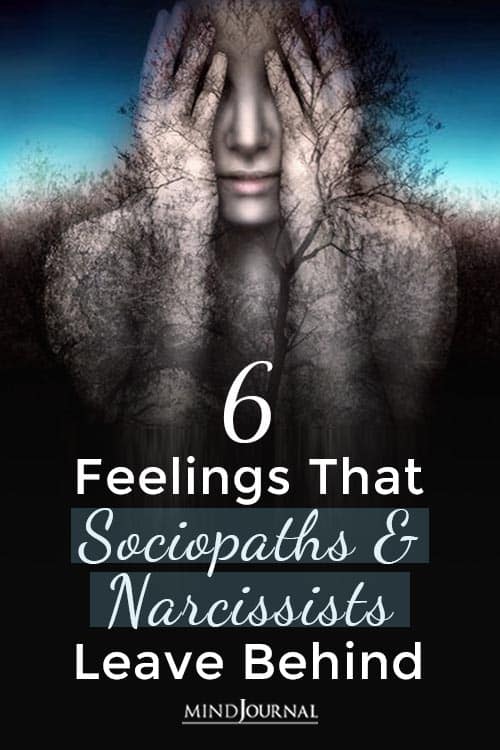When you get out of a relationship with a narcissist or a sociopath, everything seems overwhelming, and chaotic, along with you feeling lost and drained. Well, those are just a few feelings that sociopaths and narcissists leave behind.
You will be left with an unending void that nothing will be able to fill. These people totally leave your spirit broken. But when everything starts to make sense again, chances are you will be left with many mental, emotional, and psychological issues, that will take a lot of time to heal.
A lot of these things feel really uncomfortable and trick you into focusing on what you feel externally, all the while ignoring the real pain inside. Mental health issues take a longer time to heal but once you go through the recovery process, you will be able to get back to a normal lifestyle.
Sometimes, simply removing such toxic, and malevolent people from your life is the first step toward having sound mental health.
Related: 3 Mental States That Narcissists and Sociopaths Manipulate in Others
6 Feelings That Sociopaths and Narcissists Leave Behind
1. Jealousy
After being compared, triangulated, and replaced with other people, it’s completely normal to feel jealous. By default your external focus is to criticize the people you were compared with because this criticism makes you feel better.
You will only focus on these people’s negative qualities and circumstances where they were left defeated.
But this, you must remember is a temporary solution to your burn inside. This constant comparison to make yourself feel greater than the other person doesn’t resolve the inner problem, which is a deep sense of rejection and inadequacy.
When you allow yourself to break and soften, you can nurture the parts of yourself that actually need help and healing.
2. Resentment
This is one of the most deep-seated and painful feelings that sociopaths and narcissists leave behind. It is well-known among psychologists and psychiatrists how resentment is harmful to you, and how it ends up eating you from the inside.
Sociopaths and narcissists are notorious for being manipulative and infuriating; it’s no surprise that their victims end up with a lot of resentment in themselves.
But the biggest pitfall of resentment is that it blocks you from the beauty of attachment and love. It blocks you from seeing positivity in anything; it doesn’t allow you to be optimistic. Resentment actually shields you from your inner hurt by covering it with false energy.
If you are tired of feeling resentful and bitter, then mindfulness and spirituality are effective ways to approach resentment.
Approach your resentment with unconditional love, and work towards soothing yourself with a non-judgmental and kind voice that speaks to you: “This is okay. This is allowed”. Learn to accept the fact that it is alright to have resentful feelings and loathe someone when they have broken your trust.
Allow the negative energy that is harboring in you, to flow outward. If needed, you can journal it out or just vent it out in front of your close ones. The more you do this, the easier it will become to release your resentment to that loving voice.
Related: 15 Reasons Narcissists and Sociopaths Lie
3. Shame/Humiliation
A lot of survivors publicly implode during and after their relationships. They rant and rave about their toxic ex-partners, stalk them on social media, try to get even with them, and even become delusional at times, just to remove their toxic partner’s facade.
But after a point of time, when you will start feeling a bit better, you will probably chide yourself for reacting immaturely like this.
Self-forgiveness is so important for letting go of the past and allowing you to move forward. These kinds of behaviors are textbook examples of how you behave when you are mentally and emotionally damaged.
When you start to understand this, you can put down the battle axe and turn your attention inward, where it is required.
4. Self-Doubt
Psychopaths and narcissists use techniques like gaslighting to make you doubt your version of reality and your own cognitive abilities. Many of them will have you essentially blaming yourself for their cheating and abuse. Long after they have left, their accusations of “you’re crazy” will eat you up from within.
You begin to overthink even where it’s not necessary. What if they’re right? No, they’re crazy! But maybe you are too? No, it’s definitely them!
You start over-analyzing and questioning everything that you say and do, and even when you know that you have done no wrong, you don’t believe yourself and believe what the sociopath or the narcissist has told you. All of this is externally focused, and your real, internal wound remains unresolved.
Your self-doubt keeps you in an unending and endless self-analyzing loop, which lies to you constantly so that you never commit the same ‘mistake’ again, and in the process, also stops you from being your authentic self.
5. Worthlessness
This is one of the worst effects of being in a relationship with a sociopath or a narcissist.
Narcissists and sociopaths know just how to flatter you and lure you in during the idealization stage, cleverly manipulating you in basing your self-worth on their ‘kind’ words.
Once you’re hooked, they begin to inflate your deepest insecurities and belittle your greatest strengths. By the end of the relationship, you’ll be thinking they’re the only person who could ever love you the way they did. And that’s the point.
When you experience feelings of worthlessness, you take whatever little good is given to you. Many victims or survivors end up going out of their way to prove their value, and self-worth, become obsessed with perfectionism, and only focus on transforming themselves into how the sociopath wants them to be.
Never forget that malevolent people like them find satisfaction by preying on their victims’ weaknesses. The more worthless you feel, the more satisfied they are.
Related: Are You Dating an Emotional Predator? – Signs of Narcissists, Sociopaths, and Psychopaths
6. Post Traumatic Stress Disorder (PTSD)
PTSD is probably one of the worst feelings sociopaths and narcissists leave behind in their victims. PTSD happens when your body refuses to let go of your painful past.
Most of the time, psychological damage and internal conflicts end up manifesting as other symptoms like knots in the stomach, numbness, aching, tightness, and emptiness.
These physical sensations are blocking you from experiencing intolerable feelings of rejection, inadequacy, and shame. Fundamentally, it’s an inner belief of feeling stuck in the body that makes you feel separate from unconditional love.
The fact remains that you are loved by all the right people, just as you are, and at this moment. It’s just that all these emotional and physical feelings block you from recognizing and accepting genuine love, and without proper love, you will always feel lost.
And this is the main issue when you love toxic people like narcissists and sociopaths – they bring out all of the love-blocking emotions, and you fail to understand what is happening inside you.
Survivors of narcissistic and sociopathic abuse find it hard to get out of the pain they have experienced, which is why they keep on focusing on them. If you are one of them, know that you need to move on, and close the door to your past for good.
Getting out of a relationship with a sociopath or narcissist is painful as it is, don’t prolong your pain by giving them that satisfaction.
The more you give in to these negative feelings, the more power you will keep on giving them. These feelings might always be a part of you, but they do not have to control you. Trust yourself, and love yourself enough to know that what they did has got nothing to do with you. There is still a lot of light inside you.





Leave a Reply